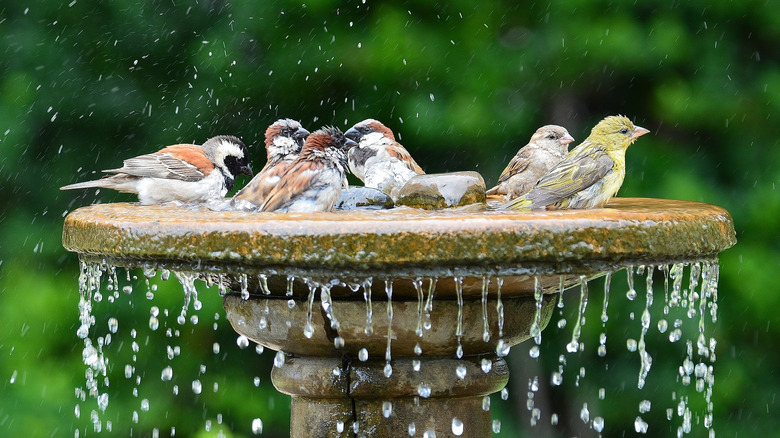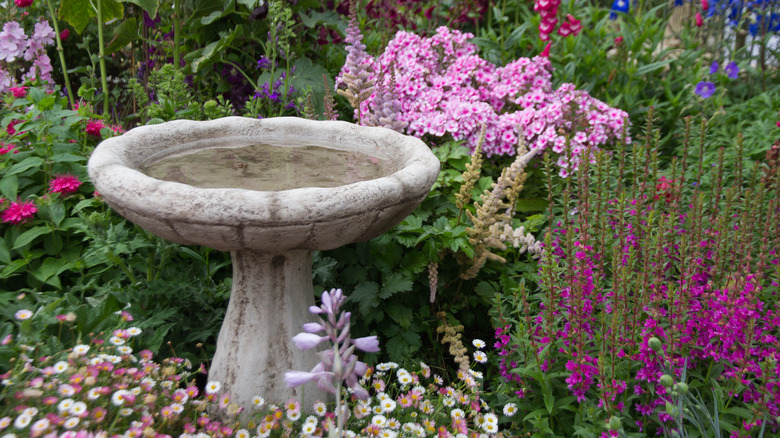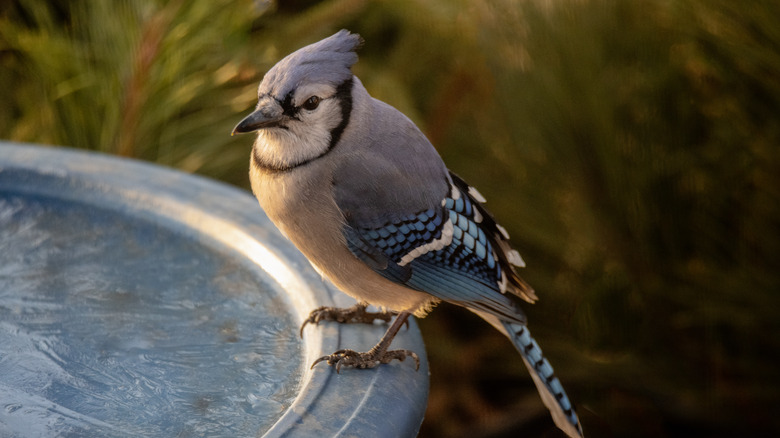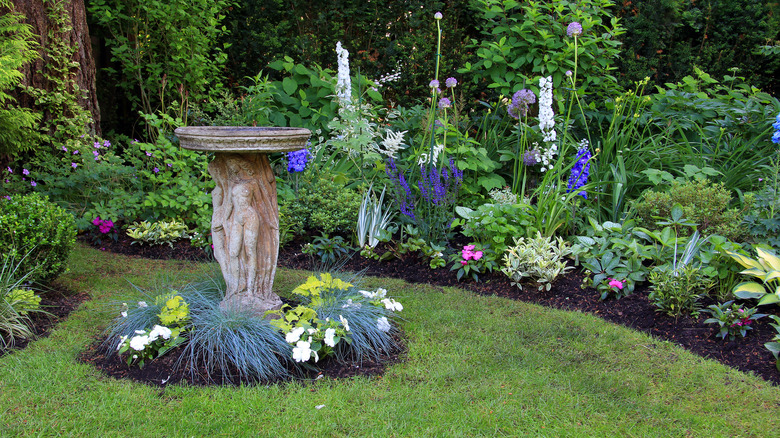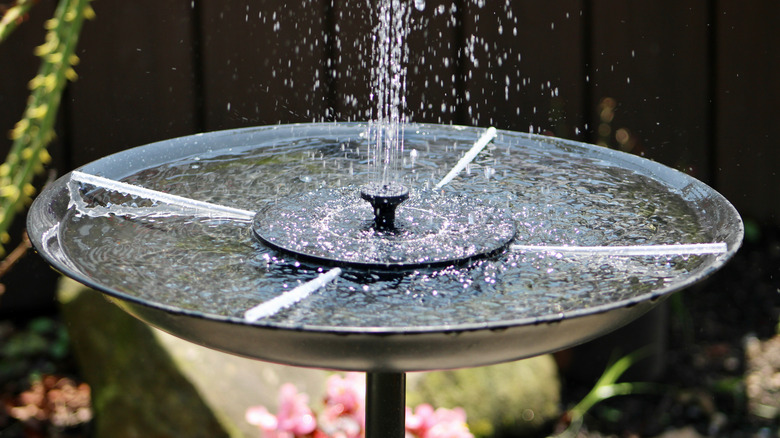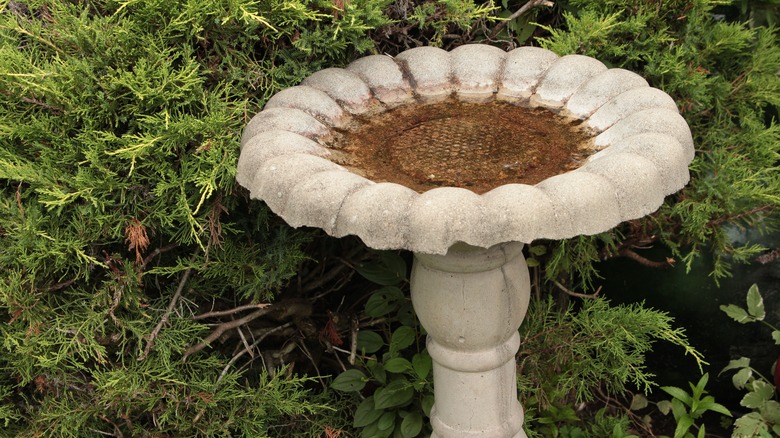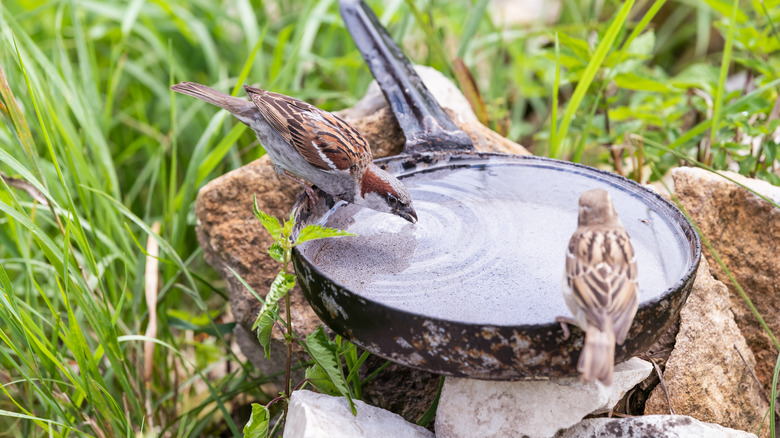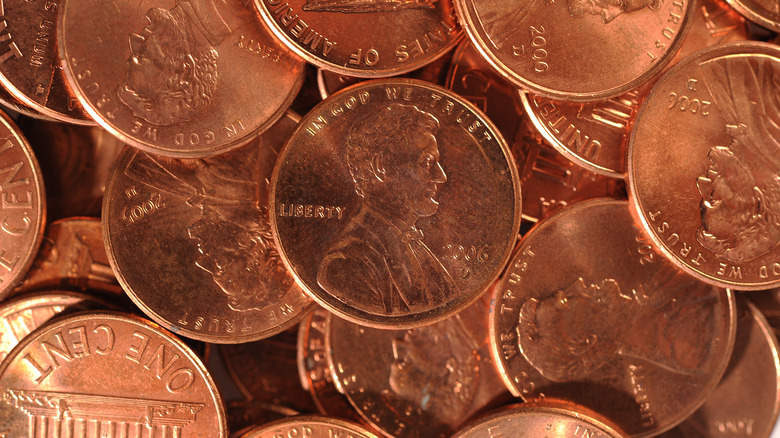7 Genius Tricks That Will Keep Your Bird Bath Clean
We may receive a commission on purchases made from links.
Whether you want to attract more birds to your yard or simply want to add a water feature to your garden bed, bird baths are a great way to do both. Your avian friends will love splashing in the water to cool off, clean themselves, and get a refreshing drink. Bird feeders bring a ton of benefits to your yard, not least of which is the birds themselves. Baths may attract birds that don't normally frequent your yard and ignore any feeders you've set out. Plus, more birds in your yard can even lead to healthier grass.
However, keeping the bath clean is extremely important to the health of the birds who use it. Dirty water can spread avian diseases while also attracting mosquitoes. If you'd love to have a water feature but dread adding another chore to your to-do list or worry about the potential upkeep, fear not! We've rounded up genius tricks that will keep your bird bath clean, require minimal effort and materials on your part, and will keep your yard full of fabulous feathered creatures.
Choose its location carefully
While a bird bath can be the perfect addition to a garden plan design, the prettiest location might cause you more work in the long run. You want to avoid placing it directly under trees and shrubs due to all the debris that will drop frequently from them into the water. Since you'll already be dealing with debris from the birds themselves, you don't want the rest of Mother Nature working against you, too. Additionally, don't put it directly underneath a bird feeder or else much of that debris will end up in the water as well.
With just a little bit of planning ahead, this can be a nonissue. Even if your bird bath is already established, a slight location adjustment can go a long way. Once you've chosen the general area for the birdies' splash pad, assess nearby foliage. The trick here is proximity. You want to place the bath near trees and shrubs, but offset from them, not directly underneath.
Always use fresh water
If you notice the water level looking low, you may be tempted to do a quick top-off and then carry on with other chores. The bath should always be around 2 inches deep, as birds prefer shallow pools for splashing and bathing. However, a top-off to get the level back up is strongly discouraged by experts. Old, stagnant water is a hotbed for bacteria, fungal growth, and mosquitoes. It poses health risks to birds and humans alike. Plus, as water quality worsens, no feathered friends will want to visit the bath, thus defeating the whole purpose of having one in the garden. If you're an avid ornithophile, you'll miss out on all the types of birds you want to see in your yard.
To avoid this problem, make sure you are in the habit of emptying the basin completely each time. Dump out the old water in the grass, in your garden, or on your driveway. If you go the grass or garden route, make sure it doesn't puddle up, as birds may be tempted to use the dirty water as a makeshift bath. Clean the bird bath (with our vinegar trick below) and refill it with fresh, clean water.
Keep it out of the sun
While there's no doubt about the endless benefits of warm sunshine, those golden rays can be more of a hindrance than a help when it comes to your bird bath. Unfortunately, the heat causes problems in a couple of ways. First, it makes the water evaporate much faster. You'll be stuck in a never-ending loop of refilling and cleaning. Second, it improves the growing conditions for fungus and bacteria, as both love warm, damp locations. Plus, the birds will enjoy their reprieve in cooler water, especially on those sweltering midsummer days.
When you're looking around your yard or garden and trying to choose the best place to position your bird bath, steer clear of any areas that receive full sun. A shady spot is ideal, but if that isn't feasible with your property, aim for a dappled sun locale. This means there's still bright light, but it's not as hot and powerful because the sunshine is never directly beating down.
Add some movement
Whether you bought a new style from the store or chose to DIY an incredible bird bath, once it's filled and ready, you'll be eagerly awaiting its first visitors. If you want to attract as much avian attention as possible, we'll let you in on a secret: birds love moving water. Experts don't entirely understand why, but the sound and motion working together will draw them to your garden in droves.
There's another benefit to moving water in your bird bath — it helps the water stay clean for longer. Because it's not sitting still and turning stagnant, algae, bacteria, and fungus can't accumulate as quickly. Mosquitoes will steer clear, too, because they prefer to lay their eggs in still water.
Depending on your budget and aesthetic preferences, numerous options are available for adding movement to your bird bath. Solar-powered fountains are a popular, affordable choice, with Amazon offering several variations for less than $20. More elaborate, tiered-style fountains offer small waterfalls or bubbling stream features. Whatever style you choose, you'll love the influx of birds and all the time you save on cleaning.
Remove algae with vinegar
Inevitably, even with proper placement, regular refilling, and a solar fountain, everybody needs to clean their bird bath. No need to buy a slew of supplies or harsh chemicals to keep your bird bath clean and fresh, though. The only expert-recommended solution you need is vinegar. Both white distilled vinegar and apple cider vinegar work equally well, so use whichever you prefer or you've already got on hand at home. Vinegar is such a versatile cleaning tool because its acidic nature cuts through residue and grime – like the algae growing in the bird bath — while simultaneously fighting bacteria. It's nontoxic, thus making it safe for animals and humans.
To clean the bowl of your bath, all you'll need is vinegar, water, rubber gloves, and a scrub brush. (A wire brush might damage your bird bath depending on what it's made of.) It's best to keep a scrub brush specifically designated for this chore, since you'll be dealing with fecal matter, dirty feathers, and other unsavory debris. Don your rubber gloves, then empty the basin completely. Scrub thoroughly with a mixture of one part vinegar to nine parts water. Give it a good rinse, then fill the bowl back up with fresh water.
Clean every two to four days
If you want to guarantee a happy splash pad for your avian friends and relaxing bird watching for you, your bird bath needs to stay clean and fresh. You can't simply set it up and then forget it. While algae growing in the basin can make birds sick if they ingest it, the bacteria from their fellow feathered friends can lead to serious illness. Due to the amount of feces that's typically in the water, E. coli and salmonellosis are common culprits. The latter is usually fatal to birds. Pair that with ongoing avian flu concerns and you see why you need to clean your bird bath on the regular.
To protect all those who come into contact with the bath — both birds and humans – make sure to clean every two to four days. This consistency is crucial for minimizing the amount of algae and bacteria present in the water.
Drop in a few pennies
We hate to be the bearers of bad news, but, unfortunately, there's no magic potion that will keep algae out of your bird bath completely. Don't throw in the towel yet, though, because there is a surprising hack that's worth trying, and its effectiveness is backed by science. It should help delay the onset of algae in your bird bath by a day or two, as long as your bath doesn't sit in a full-sun location. Copper is a natural algaecide, so dig through your spare change and round up a handful of pennies. It's not just an old wives tale — you should be putting pennies in your bird bath. The oft-overlooked coin is all you need to slow down the slimy green growth.
As you're combing through your change, only pull out pennies from 1982 or earlier. Those minted after 1982 are made mostly from zinc, not copper, so they'll be ineffective against algae. Depending on the size of your bird bath, gather five to 10 pennies. Ensure the basin is clean, scatter the coins across the bottom, fill with fresh water, and let the copper get to work.
